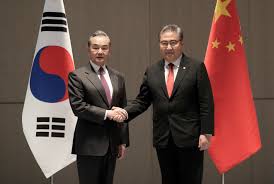The leaders of South Korea and Japan convened on Monday with the objective of revitalizing economic cooperation with China, their largest trading partner. This trilateral meeting, which also involved China, took place against a backdrop of escalating tensions between China and the United States, the primary military ally of both Seoul and Tokyo.
Historic Trilateral Meeting
Key Participants
- South Korea: President Yoon Suk Yeol
- Japan: Prime Minister Fumio Kishida
- China: Premier Li Qiang
This gathering marked the first such meeting in four and a half years, emphasizing the significance of the discussions aimed at mending and enhancing economic ties.
Focus Areas of Discussion
Economic Cooperation
Protecting Supply Chains:
- Ensuring the stability and security of supply chains was a priority, reflecting the global concerns exacerbated by recent disruptions.
Promoting Trade:
- The leaders emphasized the importance of fostering trade relationships to bolster their economies.
Addressing Demographic Challenges:
- Cooperation on managing aging populations and related social issues was highlighted as a key area of mutual interest.
Emerging Infectious Diseases:
- Collaborative efforts to combat emerging infectious diseases were discussed, aiming to enhance regional health security.
Cultural Exchanges
Years of Cultural Exchanges:
- The leaders announced that 2025 and 2026 would be designated as years of cultural exchanges among the three nations, aiming to strengthen people-to-people connections and mutual understanding.
Regional Security Concerns
North Korea’s Provocations
Satellite Launch:
- Hours before the meeting, North Korea announced its plan to launch a military spy satellite into orbit, a move that underscored the ongoing security challenges in the region.
- Following the summit, North Korea proceeded with the launch, using technology akin to that required for intercontinental ballistic missiles, which is prohibited by United Nations Security Council resolutions.
Taiwan and Other Security Issues
Delicate Topics:
- While economic cooperation took center stage, the leaders cautiously navigated discussions around sensitive regional security issues, including Taiwan and North Korea.
The US-China Context
Geopolitical Tensions
Impact on the Meeting:
- The heightened tensions between China and the United States loomed over the discussions, influencing the dynamics of the trilateral engagement.
Military Alliances
US as a Key Ally:
- Both South Korea and Japan’s security alliances with the US added complexity to their diplomatic interactions with China.
Statements from Leaders
President Yoon Suk Yeol
Practical Cooperation:
- Yoon emphasized expanding practical cooperation that would have tangible benefits for the people of the three nations.
Prime Minister Fumio Kishida
Economic Synergy:
- Kishida reiterated the importance of economic synergy and the potential for joint prosperity through strengthened ties.
Premier Li Qiang
Shared Interests:
- Li highlighted shared interests and the need for collective efforts to overcome common challenges.
Economic Implications
Trade and Investment
Bilateral Trade:
- The discussions are expected to pave the way for increased trade and investment flows among the three countries.
Economic Growth:
- Enhanced cooperation could stimulate economic growth and stability in the region.
Cultural Initiatives
Promoting Understanding
Cultural Programs:
- The planned cultural exchanges aim to foster greater understanding and appreciation of each nation’s heritage and contemporary culture.
Youth Engagement
Future Leaders:
- Initiatives targeting youth engagement and educational exchanges are expected to build a foundation for future collaboration.
North Korea’s Missile Program
International Response
UN Sanctions:
- North Korea’s satellite launch has drawn international condemnation and highlighted the challenges in enforcing UN sanctions.
Regional Stability
Security Concerns:
- The incident underscores the persistent security threats posed by North Korea’s missile and nuclear programs.
The trilateral meeting between South Korea, Japan, and China represents a significant step toward revitalizing economic cooperation and addressing common challenges. While the discussions were overshadowed by broader geopolitical tensions and regional security issues, the commitment to practical cooperation and cultural exchanges marks a positive move forward. As these nations navigate the complex landscape of international relations, their collective efforts hold the potential to foster stability, prosperity, and mutual understanding in the region.




